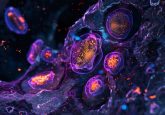QPS Taiwan: new facility expansion and the challenges of pharmacology drug-related projects

In this interview, Charlene Chen (QPS; Taipei, Taiwan) summarizes what QPS hopes to achieve with their new Center of Toxicology and Preclinical Sciences, which has been operational since December 2022. She reveals how the 2,793-square-foot facility will facilitate research expansion into additional toxicology studies, wound healing and pharmacology studies. The main challenges of running toxicology and pharmacology drug-related projects are also discussed as every test article is different and therefore an arsenal of well-defined study designs is vital to deconstruct the mystery hidden in each test article.
 Dr Charlene Chen is a Deputy Manager for the QPS Toxicology Center in Taiwan. She has 20+ years’ experience in preclinical development surrounding toxicology, PK, PD, pharmacology, immunology, efficacy models and bioavailability in numerous therapeutic areas. She also has experience in the safety evaluation of cosmetic materials including genotoxicity, skin/eye irritation, sensitization, topical and dermal toxicology studies, PDE/OEL establishment and risk assessment. Additionally, Dr Chen serves as an ad hoc specialist for the Assessment and Accreditation of Laboratory Animal Care, as an Adjunct Professor for National Taiwan University and is a member of the Society of Toxicology and the American College of Toxicology.
Dr Charlene Chen is a Deputy Manager for the QPS Toxicology Center in Taiwan. She has 20+ years’ experience in preclinical development surrounding toxicology, PK, PD, pharmacology, immunology, efficacy models and bioavailability in numerous therapeutic areas. She also has experience in the safety evaluation of cosmetic materials including genotoxicity, skin/eye irritation, sensitization, topical and dermal toxicology studies, PDE/OEL establishment and risk assessment. Additionally, Dr Chen serves as an ad hoc specialist for the Assessment and Accreditation of Laboratory Animal Care, as an Adjunct Professor for National Taiwan University and is a member of the Society of Toxicology and the American College of Toxicology.
1. Can you summarize what QPS hopes to achieve with the Center of Toxicology and Preclinical Sciences (CTPS) in Taipei, Taiwan?
For more than 10 years, QPS-CTPS has established the credibility and good reputation to provide safety evaluation services for local and international sponsors. Traditionally, healthy animals will be used in toxicology studies, however in some cases, diseased animal models can be applied for safety evaluations. We have expanded our services into the pharmacology field to provide a more complete service, and hired Dr Mei-Ling Hou, PhD to lead the new pharmacology department. She joins QPS from the Department of Pharmacology and Toxicology at the Institute for Drug Evaluation Platform, Development Center for Biotechnology (DCB; Taipei, Taiwan). Dr Hou’s expertise will strongly propel the growth and development of this new pharmacology service.
2. What diseases has the pharmacology unit focused on so far and which species are being used to support these studies?
The new QPS-CTPS pharmacology unit has already developed animal models for inflammatory bowel disease (IBD), wound healing, non-alcoholic steatohepatitis (NASH) and atopic dermatitis disease areas. Having established these models in 2023, we are working hard to establish new animal models for additional disease areas in 2024. This new unit is set up to support studies across multiple animal species, including rodents and rabbits. However, QPS does not utilize non-human primates.
3. What are the main challenges researchers face when running toxicology and pharmacology drug-related projects?
Every test article is different; even similar compounds can be unique in their own peculiarities. The main challenge is to tease out the intricacies of their activities and determine whether and how they might be impacting the clinical subjects. To meet this challenge, we have an arsenal of well-defined study designs at our disposal to deconstruct the mystery hidden in each test article. What we do is critical for the development of a therapeutic option, since even a life-saving drug can be a poison when not administered properly. Ultimately, there is no experience more fulfilling than when the total effect of the test article is conclusively demonstrated and presented, in a final report, for its furtherance to be a lifesaver that makes the difference to a patient.
4. How has the new facility enabled QPS’s expansion into additional toxicology/pharmacology studies?
The 2,793-square-foot facility will facilitate a research expansion into additional toxicology studies, wound healing studies established in 2022, and the newly launched capability in pharmacology studies. In addition, the new facility, which has been operational since December 2022, will give QPS significant additional flexibility in study scheduling and additional space to grow the existing toxicology business and to build the new pharmacology unit. Designed to ensure that the utmost care is taken with all toxicology and pharmacology studies, this new research facility boasts well-equipped, fully accredited animal centers and a state-of-the-art pharmacology unit.
5. Which project are you most looking forward to completing and why?
QPS is a global, full-service CRO with a reputation for reliably delivering custom-built preclinical, bioanalytical and clinical drug development projects around the world for the past 25 years. With the new pharmacology services at QPS-CTPS, we look forward to evolving the way we work with sponsors. QPS can start a sponsor’s drug development project with pharmacology studies and move with the sponsor through the process across DMPK, to toxicology, setting up the necessary bioanalysis assays and eventually conducting Phase I–IV clinical trials for the successful compounds. As a full-service CRO, QPS has the expertise and capabilities to contribute and collaborate on the development of new drugs from the earliest studies through to NDA submission.
6. What do you hope the new facility will have achieved in 5 years’?
Aligning with the biotech and pharmaceutical industry from preclinical through clinical studies, and expanding our pharmacology, toxicology and bioanalysis services, this new center of excellence will ensure that QPS-CTPS has the skills, capabilities and space to fully implement global pharma and biotech toxicology and pharmacology drug-related projects.
7. Are there any new projects you can share with us that are on the horizon at QPS in Taiwan?
QPS has a center of excellence for neuropharmacology at QPS Austria in Europe. We are very interested in developing a center of excellence in neurodegenerative diseases at QPS in Taiwan and we already have multiple projects ongoing in this area. In one recent example, we have provided strategic planning, regulatory consultation and preclinical study execution for a sponsor’s project focused on neurodegenerative diseases. This drug candidate is expected to enter the clinical trial stage later this year, and we anticipate continuing work on this project by providing clinical services, bioanalytical services and chronic toxicology studies.
In association with







